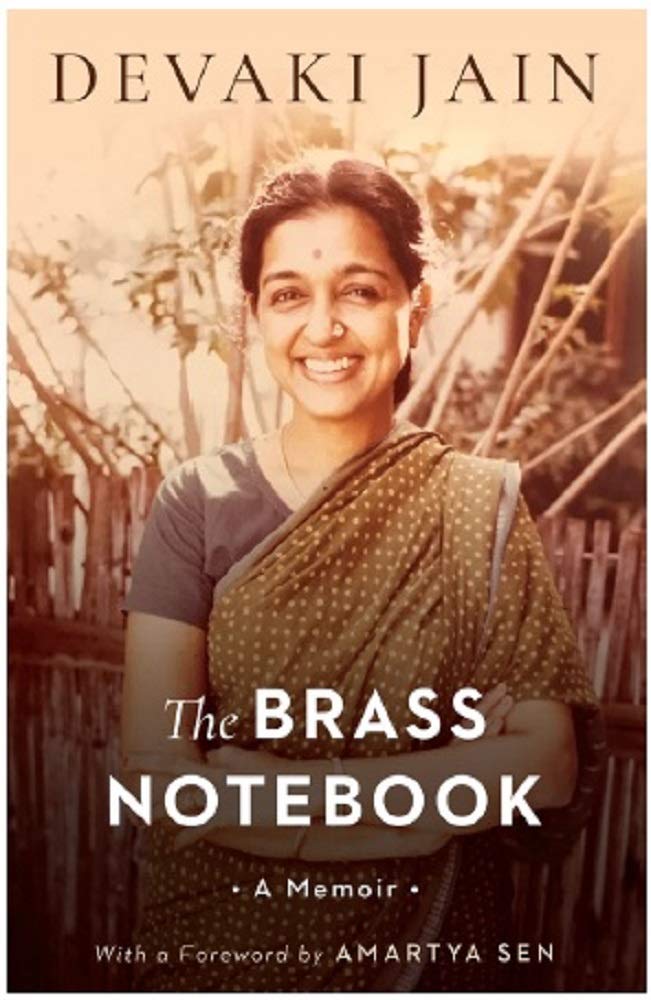The strange title of The Brass Notebook is a nod to Doris Lessing’s The Golden Notebook, and that (in my view, quite inappropriately!) suggests a comparison of the author’s life to brass vessels which were used in Indian kitchens. Was my generation the last to see such vessels in our kitchens, or do such vessels still exist in our nation’s remote reaches and disadvantaged corners?
Anyway, far from being anything like a mere brass vessel, the author is more like a chandelier: well-known in academic and administrative circles in India as well as abroad. Indeed, she was awarded a Padma Bhushan in recognition of her outstanding accomplishments in economics, which focus on the role of women in economic life, and contributed hugely to social justice as well as to the empowerment of women in the last 60 years
Among her contributions that will never be forgotten is her creation of the term “feminization of poverty” – by which is meant that women are poor more often than men, as well as that women’s poverty is worse than that of men, and that female-headed households are more likely to be poor. She also controversially pointed out that “feminization of work” connotes low-quality, low-paid work. In other words, that the increased presence of women in the workforce may not always and in all respects be the boon to overall human welfare that it is often made out to be. But it is not such academic points that are her greatest contributions. Those are her writing, lecturing, networking, leading, encouraging, mentoring and supporting women in all walks of life, not least in local, national, and international women’s movements. Though she feels that she has never been the “influential academic economist” that she might have become, she has in fact been someone far more important: an economist who has shaped policies and therefore improved the lives of millions of women both in India and abroad.
Her brightly chatty style makes her memoir very easy to read, especially as she doesn’t pull any punches in recalling child sexual abuse by a family member, discusses the tormented and confusing thoughts of a growing girl, and retails her adventures hitchhiking across Europe in the 1950s, as well as the romantic story of her love for the Gandhian activist and writer Lakshmi Chand Jain, whom she married – an unorthodox life choice (marrying someone outside her caste and religion, against the expressed objections of her dearly beloved father).
The psychological challenges of being a young mother, the sense of being overwhelmed at the multiple demands of family and work (to the point of even contemplating suicide!), and the turmoil caused by the ‘vengeful wrath of a sexual predator’, an eminent Swedish economist whom she does not name – all contribute to conveying a sense of the enormous richness of her life experiences, even if they were not all sweetness and light.
She had, too, the excitement and fulfilment of contributing to national as well as international development, with opportunities to meet and often work with international celebrities such as Rosa Parks, Julius Nyerere, Nelson Mandela, Desmond Tutu, Amartya Sen (who’s written the foreword to this memoir), Gloria Steinem (writer and feminist activist); and of course the novelist Doris Lessing. What comes across, however, is her deep debt and admiration for the women of her family with their radiance and their resilience.
Devaki Jain typifies a generation of ethically engaged women nation builders who were imbued with Gandhiji’s approach. Not necessarily in the sense of accepting all of his sometimes strange ideas, but in the sense of being summoned out of the confines of traditional Indian role of women in the household to take on the stirring challenge of tackling the enormous tasks facing an independent India – as a nation-in-the-making of course, but also as one of the leading countries in a decolonising world.
Today’s India continues to exhibit the incredible contradictions of a nation-still-in-the-making, but it also faces the threat of a retreat from what little resolution of those contradictions we have had till now.
I wonder what Jain makes of the loss of hope as not only the nation’s elite but also a substantial minority in our nation appear to have now rejected Gandhiji’s approach: will her life’s work in improving equity, decentralization, democratisation, people-centered development, and women’s rights continue to bear fruit in our nation? Or will it be consigned, at least for the immediate future, to the dustbin of history?
That is a poignant question that Jain does not raise in her memoir, but it is a question that will arise in the mind of every reader of this cheerful and inspiring account of a life lived by the highest ideals.
Whatever the future, it will be brighter because of her memoir, which will help to keep alive the ideal of an egalitarian, caring and humane future for our nation and for our world. I would recommend you to read The Brass Notebook.


